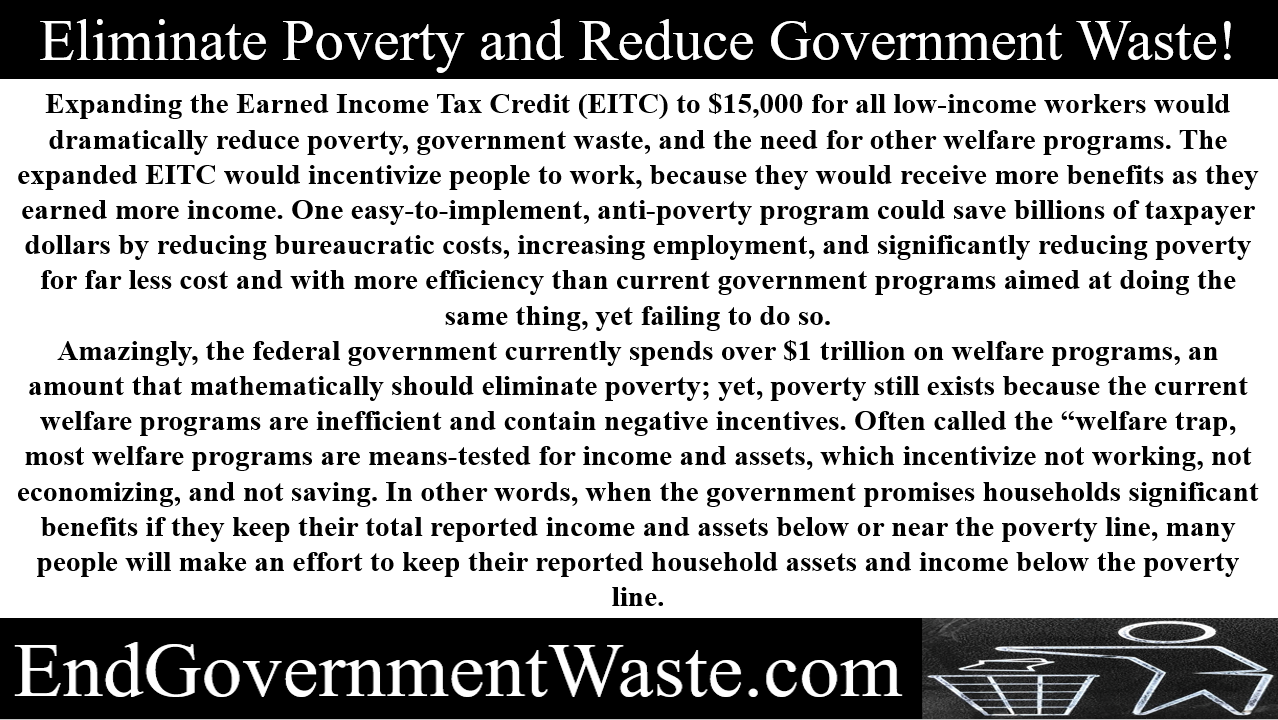

Expanding the Earned Income Tax Credit can dramatically reduce poverty, government waste, and the need for other welfare programs.
One easy-to-implement, anti-poverty program could save billions of taxpayer dollars by reducing bureaucratic costs, increasing employment, and significantly reducing poverty for far less cost and with more efficiency than current government programs aimed at doing the same thing, yet failing to do so.
The Earned Income Tax Credit (EITC) is a benefit for working people with low to moderate income who meet certain requirements and file a tax return. If significantly expanded, the EITC would incentivize people to work, because they would receive more benefits as they earned more income, up to a certain level. After they reached a certain income level and became more financially independent, the supplemental benefits would begin to phase out.
For example, if the maximum EITC was expanded to $15,000 for all adults, for up to the first $15,000 of wages that a person earned, the federal government could provide a one to one supplemental match for each dollar earned. Then, for each additional dollar of earned income over $15,000, the supplement would decrease by half, until the supplement would be totally phased out at $45,000 of earned income. Thus, a person that makes $15,000 in earned income would receive a supplement of $15,000, for a total income of $30,000. A person that makes $30,000 would receive a supplement of $7,500 ($15,000-$7,500), for a total income of $37,500.
Amazingly, the federal government currently spends over $1 trillion on welfare programs, an amount that mathematically should eliminate poverty; yet, poverty still exists because the current welfare programs are inefficient and contain negative incentives. Often called the “welfare trap, most welfare programs are means-tested for income and assets, which incentivize not working, not economizing, and not saving.
In other words, when the government promises households significant benefits if they keep their total reported income and assets below or near the poverty line, many people will make an effort to keep their reported household assets and income below the poverty line. Whether a person works less or works for cash under the table or by under-reporting tips, the person has an incentive to show less income. Single parents who could economize by having a roommate are incentivized not to have a roommate because of the household income test. For programs that perform asset tests, individuals cannot save money with the goal of investing or buying a house, because they would lose their benefits. And if a person does have money, they can’t put it in a bank savings account to earn a return.
Replacing ineffective and inefficient programs with an expanded EITC program would save taxpayer dollars while incentivizing people to work and show income, which would drastically reduce poverty statistics in a short period of time. Further, this expanded EITC would be more effective than raising the minimum wage because a minimum wage could not raise wages of low-income workers to the income levels that the EITC could, and it would cause widespread unemployment as employers could no longer afford to pay employees. In short, as the total government-mandated employee minimum wage increases, many jobs will be eliminated or replaced by automation.
An expanded EITC program is also a far better option than Universal Basic Income (UBI). UBI is the concept that the federal government should give all adult citizens a guaranteed income, with no work requirement or means test. UBI reduces the incentive to work and also reduces the overall standard of living in the country. For example, if UBI would be set at $12,000 per year, a household of three adults could receive $36,000 per year, which could drastically reduce their incentive to work and contribute to the tax base that pays for UBI. People may decide to live on UBI, not work or contribute, all at the expense of everyone else working and contributing tax dollars to UBI. A large percentage of households would be paying in taxes just to have their own money returned to them in a check from the government, which is a perfect example of bureaucratic waste. And principally, should the government be taking money from hard working Americans so that it can pay able-bodied individuals who are not required to work to receive the benefit?
Combining smart economics with compassion and replacing the current welfare system by expanding the EITC promotes work ethic, personal dignity, and a healthy economy.
